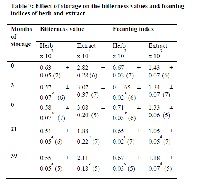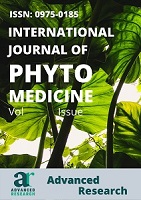Physicochemical variables and real time stability of the herbal substance of Niprd-AM1®- an antimalarial developed from the root of Nauclea latifolia S.M. (Rubiaceae).
Keywords:
Niprd-AM1, Nauclea latifolia, Antimalarial, Physicochemical, Stability, Good pharmaceutical practice (GXP)Abstract
The evidence for using the root of Nauclea latifolia S.M. (Rubiaceae) in treating malaria in Africa; and the development of Niprd AM1, as an antimalarial phytomedicine from it, are reviewed. This study aimed at paving the way for the registration and controlled production of Niprd-AM1, which was developed by National Institute for Pharmaceutical Research and development (NIPRD), Abuja, Nigeria. The study applied official procedures to authenticate and evaluate the changes that occur during normal storage in the physicochemical variables of the herb and extract. The herb contained alkaloids, saponins, terpenoids, but cardiac and cyanogenic glycosides and anthraquinones were not detected. Heavy metal presence was well below the limits allowed. Most of the quality variables evaluated, including TLCs, remained largely unchanged up to the 39 month of storage, but a few began to decline as from the 21st month. The results are consistent with NIPRD’s intention to regularize the production and use of Niprd-AM1 according to good pharmaceutical practice (GXP), and suggest that the dried herb and extract are stable under tropical room conditions for over a year in sealed glass containers.
References
Snow RW, Guerra CA, Noor AM, Myint HY,
Hay SI. The global distribution of clinical
episodes of Plasmodium falciparum malaria.
Nature 2005, 434 (7030): 214–7.
Ransome-Kuti O. Address by the Honorable
Minister of Health and human Services. In:
Rational use of antimalarial drugs. Ed. Obi,
C. C., as: Proceedings of the National
workshop organized by the Federal Ministry
of Health and Human Services and May and
Baker Nigeria Plc, at Banquet Hall, Lagos
Airport Hotel, Ikeja, on May 21, 1992.
Lamidi M, Ollivier E, Faure R. Debrauwer L,
Nze-Ekekang L, Balansard G. Quinovic acid
glycosides from Nauclea diderichii. Planta
Med. 1995, 61:280–281.
Benoit-Vical F, Valentin A, Cournac V,
Pélissier Y, Mallié M, Bastide J. In vitro
antiplasmodial activity of stem and root
extracts of Nauclea latifolia S.M.
(Rubiaceae). J. Ethnopharmacol. 1998, 61 (3):
-178.
Onyeyili PA, Nwosu CO, Amin JD, Jibike
JI. Anthelmintic activity of crude aqueous
extract of Nauclea latifolia stem bark against
ovine nematodes. Fitoterapia 2001, 72(1):
-21.
Abreu P, Pereira A. New indole alkaloids
from Sarcocephalus latifolius. Natural
Product Letters 2001, 15 (1):43-48.
Gamaniel K. A comparative randomized
clinical trial of NIPRD AM1 against a
chloroquine and sulphadoxine/pyrimethamine
combination in symptomatic but
uncomplicated malaria. African Journal of
Traditional, Complementary and Alternative
medicines (AJTCAM), Abstracts of the World
Congress on Medicinal and Aromatic Plants,
Cape Town, November 2008.
WHO. Quality Control Methods for
Medicinal Plant Materials. WHO, Geneva;
128 p.
Harborne JB. Phytochemical Methods. 2nd
Edition. Chapman and Hall, London and New
York. ISBN 0-412-25550-2. 1984. 288 p
Onwukaeme DN, Ikuegbvweha TB, Asonye CC.
Evaluation of Phytochemical Constituents,
Antibacterial Activities and Effect of Exudate of
Pycanthus Angolensis Weld Warb
(Myristicaceae) on Corneal Ulcers in Rabbits.
Trop. J. Pharm. Res. 2007, 6 (2): 725-730.
Obodozie OO, Ameh SJ, Afolabi E. K., Oyedele
EO, Ache TA, Onanuga CE, Ibe MC, Inyang US.
Standardization of the components of Niprisan: a
phytomedicine for treating sickle cell disease. J.
Med. Plants Res. 2009, 3(4): 284-289.



